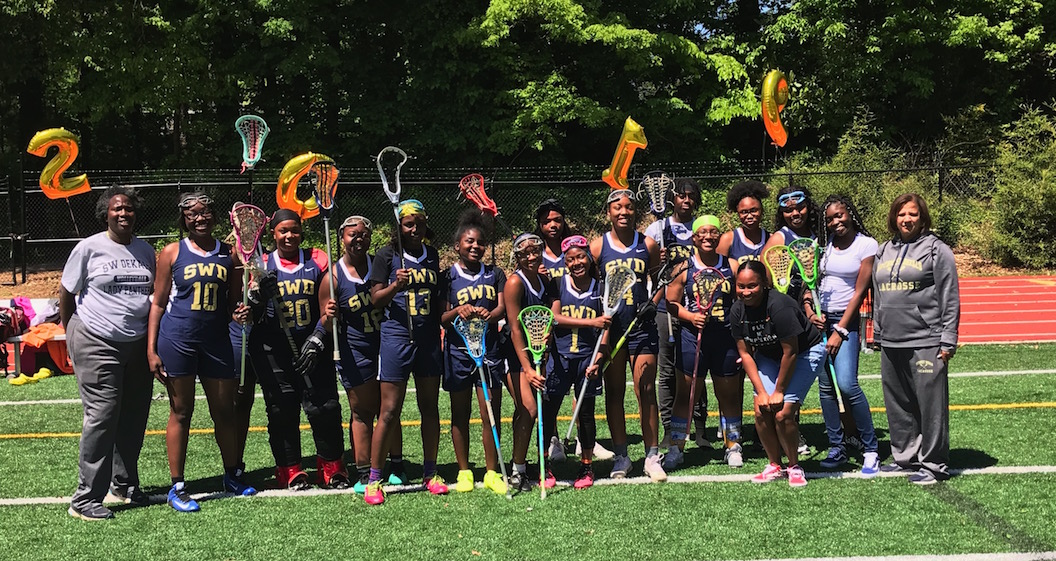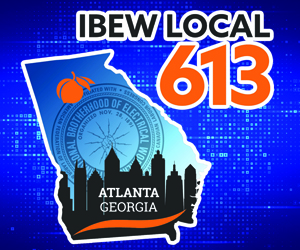
On Saturday, April 27, Coach JT Thomas was looking ahead to the girls lacrosse state playoffs. His Henry County Hawkettes had secured the No. 4 seed out of Area 7 three days prior with their 17-14 loss to Woodward Academy. Forty-five miles north of Henry County, however, a potential playoff berth was very much still on the line as Southwest DeKalb and Chamblee faced off at North DeKalb Stadium in their season finale.
Chamblee got off to a fast start and took a 6-3 lead into the half, but Southwest DeKalb answered. The Panthers eventually grabbed a 7-6 advantage before a late Bulldogs goal forced overtime. Tied at 7-7, Southwest senior Jayla Middlebrooks won the faceoff and fired in the game-winning goal just 24 seconds into the extra period. The Panthers got the 8-7 OT win, and in doing so joined Henry County as the first two all-black girls lacrosse programs in GHSA history to make the state playoffs.
“I wasn’t too nervous because we had a tendency to get off to a slow start,” said Southwest DeKalb head lacrosse coach Kathy Walton. “I was just hoping we didn’t go down four or five goals. I felt if we kept it close, we’d eventually be able to get it back one goal at a time and we did.”
Coach Walton is better known for her role as head basketball coach at Southwest DeKalb, where she has been at the helm for 18 seasons and led the Panthers to five state titles. Before coming to the school, however, she was a former quadruple sport athlete at Ashland University in Ohio, excelling in basketball, softball, field hockey and lacrosse. Her experience with the latter compelled her to spend years trying to get Southwest DeKalb to add a lacrosse program. In 2011, her commitment finally paid off, and she was ready to take on the next set of obstacles.
Funding a lacrosse program and getting kids to try out were the initial challenges. Fortunately, the school sent an application to the U.S. Lacrosse First Stick program, ultimately qualifying for a grant that supplied them with 20 sticks and 20 goggles.
“The First Stick Program really helped because we were recruiting kids who have never seen the sport before and they didn’t know if they wanted to make that investment,” said Walton. “So we were able to recruit them to play because they didn’t have to make that initial investment and they just come on out and pick up a stick and start playing.”
Sisters Calyn and Casey Kelly were on the basketball team, but at Coach Walton’s encouragement, they were among the group of girls who came out and picked up the stick for the first time. They would receive more than 50 scholarship offers apiece by the time they graduated. Calyn, who is one year older, became the first player to represent DeKalb County in the Georgia All-Star game. She continued her career at Reinhardt her freshman season before transferring to Tusculum. Casey will graduate from Lincoln Memorial University this Saturday after compiling a school-record 171 points in her four seasons at the school.
“I could sense from the Kelly’s parents (Ernest and Vicki) that they believed this could be an opportunity for their daughters that we don’t normally take advantage of,” said Walton. “As far as myself, I also wanted to expose our community to something that we don’t usually have. Lacrosse is something that I benefited from playing, and you never know who the next person is that will be able to take advantage of it. And the Kelly sisters certainly did.”
The success that the Kelly sisters had with the sport is one of the first signs of a growing trend in the metro Atlanta Area of communities introducing this sport they previously did not have access to and excelling.
“I don’t think the Kelly sisters would’ve gotten the same opportunities playing basketball even though they had been playing that sport since they were little,” said Walton. “That market is so satiated and so full that there aren’t many opportunities like there are being offered in some of the non-traditional sports. So if we could make parents aware of the opportunities, we’ve seen kids year after year that once we expose them to the sport and they play it, they really do enjoy it. It’s a lack of information and our community just doesn’t know.”
Middlebrooks is the latest Southwest DeKalb star to earn a scholarship, and she will play attack for Gardner-Webb next year. But first, she’ll be leading the Panthers tonight as they take on top-seeded Wesleyan in the opening round of the state playoffs.
“I was mentioning to our county [Athletic Specialist] Mark Brock that my enthusiasm quickly dwindled when I saw who we got matched up against,” said Walton. “One minute you are on cloud nine and then it’s ‘Oh gosh’ again. They came out No. 1 in their Area. The teams that they had to beat in order to do that is impressive, but as we were practicing [Tuesday], I was talking to the girls, and we know what to expect. We know the style of play, but I don’t know if they have played against our speed and athleticism. So we aren’t going to look at what we can’t do; we are just going to go out there and do what we’ve been doing all year and just go out there and compete. We’re just going to show up and do the best we can.”
Back down south, the Henry County Hawkettes are preparing to face fellow Henry County school Union Grove on Thursday. As incredible as Southwest DeKalb’s lacrosse program’s story has been, in many aspects, Henry County’s rise to success seems even more improbable. Unlike Coach Walton, who had experience playing the sport, Henry County Head Coach JT Thomas was just as new to lacrosse as his girls when the school got a program three short years ago.
“I had no idea about the sport,” reflected Thomas. “I was just as terrified as the girls were, but I went with the same message I was preaching to the girls: It’s bigger than you.”
Like many of the programs that have popped up in underserved communities in recent years, Henry County has had to do a lot more with a lot less. The program held its first-ever practice in February of 2017. A total of 35 girls came out, but there were only six sticks to go around. Thomas had to set up 3-on-3 drills while the other girls conditioned and would rotate them in and out. It wasn’t until this past season that the school received a grant from the First Stick program to equip the team.
“We have had to pick up the bulk of everything money wise,” said Thomas. “I went and found the cheapest set of jerseys I could find and we got about 35 jerseys for about 200 dollars which is unheard of. All of our equipment, we’ve had to buy sell, trade and swap. As far as referees are concerned, we have to pay for our refs, but our AD tells us, it’s our call. If we can afford to pay for our refs, we can have as many home games as we can on our schedule.
“If you are one of those programs that is struggling to get their refs paid for, then they want to evaluate the number of home games that you will be playing in. Fortunately, we have gotten people in the stands and so I am confident telling the girls, folks will come if you give them a good game. Give them something to go home and talk about afterwards and give them something to be excited about.”
The Los Angeles Inner-city Lacrosse Association posted a budget outline for what a first-year startup girls lacrosse team would cost. After the uniforms, equipment, goals, officials and transportation was accounted for, the total tallied more than $8,000. Henry County completed its first year with a budget right at $2500 and, unlike the LA budget outline, that number included the cost of feeding the girls on game days. What the program lacked financially, however, they have overcome with opportunism and common purpose.
“It’s funny to me, to be honest with you,” said Thomas. “I didn’t expect things to happen how they are happening right now.”
Remarkably, girls lacrosse is growing throughout the county. As of this season, all nine public high schools in Henry County have girls lacrosse programs. Only one has a boys program.
Henry County’s program is already home to an emerging lacrosse star in Angie Ford (No. 9). She was only in the eighth grade when Henry County held that first practice, but since the Hawkettes were not a varsity program until the following year, she was able to compete on the team. That extra year of experience paid off. She netted the team’s first-ever GHSA goal and finished with nine goals in her first game. Her career goals mark surpassed 100 back in April and she scored a career-best 10 goals in the loss to Woodward Academy. Ford also made the Georgia National team this past month, so she will be in Baltimore this summer to compete with the top lacrosse talent in the country.
“I think it is great to expose your kids to as much as you can. This has been a sport that for us, that not only not a lot of minorities have played, but really a sport that not many people in this area know about. And just to expose children to it and give them another avenue if they can handle business academically to help themselves out going to college. Not every kid is going to want to be a collegiate athlete, but playing the sport can still help them get into a college.”
Like Coach Walton, Coach Thomas just wants his girls to be the ones taking advantage of any overlooked opportunities.
“It is becoming more and more competitive to get into schools and a lot of them will not only look at transcripts, but they want to look at your social activities, what clubs you are involved in and how much time you spent volunteering,” said Thomas. “They want well-rounded students and if they can see that a kid can invest their time and manage it doing fundraising, participating in sports, participating in the community and maintaining great grades, that is going to be a kid that they’ll know can handle the pressure of college.”
As Henry County and Southwest DeKalb make their first appearances in the GHSA playoffs tonight, they will not only be participating in the next chapter of lacrosse in the state of Georgia — they’ll be shaping it. Regardless of the outcome of these games, the noise these new programs are making seems set to continue well into the future.
“It’s a good time to be involved with the sport right about now, because it’s exciting, folks are learning about it and programs are popping up. Years from now, these girls are going to be able to say that they were a part of that big push when lacrosse first took off in Georgia.”






















































